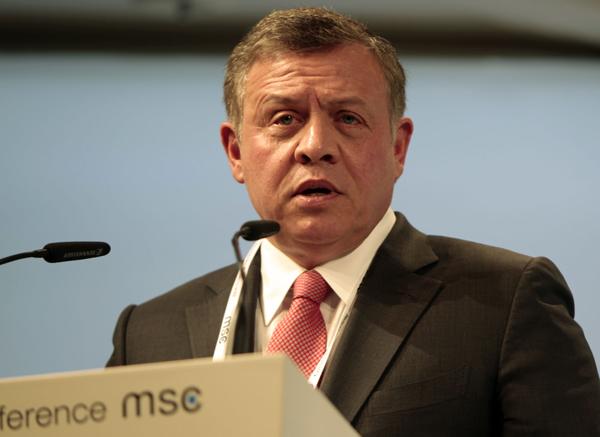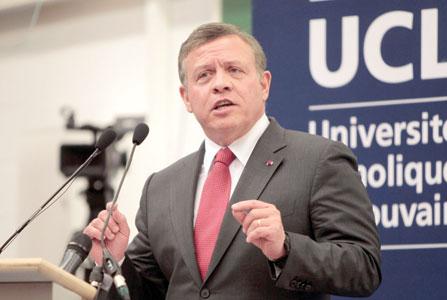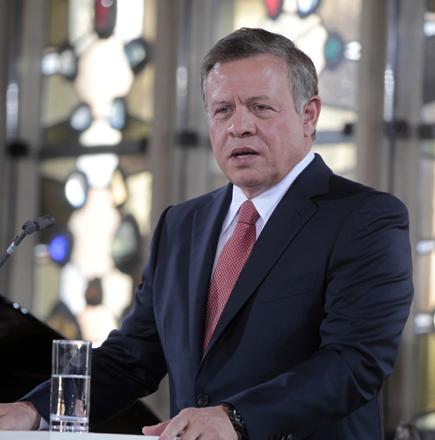You are here
‘Failed states, conflict zones and sectarian divisions are fertile grounds for terrorism’
Feb 13,2016 - Last updated at Feb 13,2016

Following is the full text of His Majesty King Abdullah’s speech at the 52nd Munich Security Conference in Germany on Friday:
In the name of God, the Most Merciful, the Most Compassionate,
Minister von der Leyen,
Ambassador Ischinger,
Distinguished colleagues:
Vielen Dank. Thank you. It is a pleasure to be here in Germany again. The Jordanian and German people share many bonds, but above all, deep common values: peace, mutual respect, the well-being of all. Such principles have empowered Germany’s vital role in the peaceful transformation of Europe and the world. No one symbolises that better than my good friend Chancellor Merkel. I have closely witnessed her strong leadership in the war on terror and in facing international challenges. As a close friend of Germany, I greatly respect her wisdom and tremendously admire her vision.
My friends,
We have all heard strategists warn about the dangers of being stuck in the past — ‘fighting the last war’ instead of the present one. Let us recognise that, here and now, we are all fighting the next war: a new and complex struggle for the future.
I’ve called this struggle a ‘third world war by other means’. The point is not simply that the threat is global – although, indeed, it does impact the entire international community. But world wars share something else as well: they are massive change agents. Winning or losing this global war will shape global values and define our security and way of life long into the 21st century.
Today, we share a core strategic interest in coalition victory in Syria and Iraq. The end for Daesh in Syria and Iraq requires our concerted action, and it is a priority in our region. Yet, winning the war for the future requires more. We need to acknowledge that Daesh is only part of a global threat.
Failed states, conflict zones and sectarian divisions have been fertile grounds for this cancer. It has instigated violence and inhumanity across borders and lured agents from across the world. We in this room know better than anyone that no region has been exempt.
My friends,
This is why I cannot overstate the importance of a holistic approach. We cannot succeed by focusing on uprooting Daesh from Syria or Iraq while other terrorist groups and affiliates strengthen in Africa and Asia. It is time for a new level of global action focusing our resources, coordinating our responsibilities and synchronising our military and security efforts. Our countries, our international institutions, must work collectively, as a truly global alliance.
We, as Arabs and Muslims, have a responsibility and duty to be in the lead in the fight against the khawarej, or outlaws of Islam. This is a war to protect our religion, our values and the future of our people.
But it is also an effort that must be global in partnership, just as it is global in scope. All our peoples are threatened by the outlaws’ ideology of violence and contempt for human life. To counteract this threat, our countries must be equally committed to the ideas that unite us in this war — from our shared humanity, to the search for political solutions, to the importance of global justice.
The Syrian refugee crisis is an urgent case in point. One of the biggest humanitarian tragedies of our age is unfolding on our shores and borders. Nowhere has this been brought closer to home than in Jordan, which now hosts one Syrian for every five Jordanians.
Our world must also act as one on the diplomatic front. The killing in Syria has to stop if we are to move forward and find a political solution, one that protects Syria’s independence and integrity, and enables the Syrian people to live with dignity and enjoy the rights they deserve. Achieving that solution is key to winning this war together, and will help us focus on the global threat.
My friends,
There are other key steps we must take together. Supporting the Iraqi government in clearing its towns and villages of the control of Daesh also requires support for serious steps towards reconciliation. We should not allow sectarian and religious differences to be used to advance political agendas or gain influence.
And the community of nations cannot talk about universal rights and global justice, but continue to deny statehood to Palestinians! This failure has created a festering injustice, and continues to be exploited by Daesh and its kind. Our whole world has paid the price. Left unresolved, the Palestinian-Israeli conflict will become a religious conflict of a global dimension. And it is only a matter of time before we may be faced by yet another war in Gaza or in south Lebanon. This is why reaching a two-state solution should remain a priority for us all.
My friends,
I would like to add a word about Europe.
Europe, clearly, has a special interest in supporting us across the Mediterranean. But it is also essential not to ignore the challenges that face us in the Balkans. Muslim-majority countries in the Balkans deserve our support to pre-empt the threat of extremism.
These countries are Europe’s front line against extremism and its first line of defence. Nothing could be more costly to Europe than rising instability and extremism in the Balkans. It is, therefore, vital to shut out extremists, on all sides, who seek to manufacture division in that area of the continent.
A key challenge today lies in the ability of some, who take advantage of the cover of Islam, to advance political agendas in the Balkans that are not in the interest of Europe. This is something we should act together to prevent.
I appeal to you here to reach out to countries such as Bosnia-Herzegovina, Albania and Kosovo. These countries, including others in the Balkan region, should be an integral part of Europe’s architecture and pillars of your security and prosperity. Bring them closer to you as models of coexistence, moderation and tolerance so they become Europe’s front line of stability.
I hope that here, at the Munich Security Conference, we can address this issue. Let’s not find ourselves meeting again in a few years to discuss threats that we could well have prevented.
It is you, the national and international leaders gathered here, who know best what we are up against. And it is you who can best help our countries come together in response. For if we do not act now, the dangers will only grow; and if we do not act in concert, we will miss further opportunities for success.
Thank you.
Related Articles
His Majesty King Abdullah on Wednesday reiterated his call for a global partnership based on a comprehensive approach to fight terrorist gro
Following is the full text of His Majesty King Abdullah’s speech to the European Parliament in Strasbourg on Tuesday
Following is the full text of His Majesty King Abdullah’s speech at the Peace of Westphalia Prize ceremony in Munster, Germany, on Saturday.














